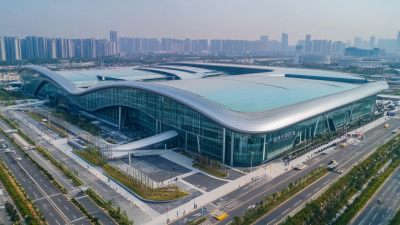In an era where global trade is continuously evolving, the need for innovative cargo shipping solutions has never been more critical. As businesses strive to improve efficiency and reduce costs, the logistics industry is witnessing a revolutionary transformation driven by technology, sustainability, and smarter operations. This blog aims to explore real-world examples of successful cargo shipping strategies that exemplify innovation and effectiveness. By examining cutting-edge practices, from automation and digital tracking to eco-friendly transportation methods, we will uncover how companies are not only meeting today's demands but also setting the stage for the future of cargo shipping.

Join us as we delve into the transformative solutions that are reshaping the landscape of logistics and propelling businesses toward greater agility and success.
In the ever-evolving landscape of global trade, cargo shipping is undergoing a remarkable transformation driven by innovative approaches from industry leaders. One compelling case study comes from Maersk, which has integrated digital technologies and real-time data analytics into its operations. By utilizing IoT sensors on containers, Maersk has significantly improved its supply chain visibility, allowing clients to track their shipments in real time. This not only enhances customer satisfaction but also minimizes delays and reduces costs associated with lost or damaged cargo.
Another noteworthy example is the implementation of sustainable practices by CMA CGM, a frontrunner in eco-friendly shipping solutions. The company has invested in biofuel technology and optimized shipping routes to lower carbon emissions. By adopting a holistic approach that combines advanced logistics with environmental responsibility, CMA CGM has set a benchmark for the industry, demonstrating that profitability and sustainability can go hand in hand. These case studies highlight how embracing innovation in cargo shipping not only boosts efficiency but also paves the way for a more sustainable future in global trade.
The advent of automated shipping technologies is reshaping the logistics landscape, much like the transformative potential of autonomous vehicles. In various industries, companies are beginning to merge traditional shipping methods with cutting-edge automation, leading to enhanced efficiency and reduced costs. For instance, the deployment of automated drones for inventory restocking in warehouses exemplifies this trend. These drones not only streamline operations but also minimize human error, ultimately accelerating the supply chain process.
Real-world implementations highlight the successes of such technologies. Firms leveraging automated shipping solutions have reported significant gains in productivity and turnaround times. These advancements reflect the broader implications of automation within transportation—similar to how self-driving cars promise to revolutionize personal mobility. As these systems continue to evolve, they will undoubtedly pave the way for innovative solutions in cargo shipping. The synergy between technology and logistics is fostering a new era of efficiency, setting a precedent for the future of global trade.
| Shipping Method | Technology Used | Efficiency Improvements | Success Metrics |
|---|---|---|---|
| Automated Guided Vehicles (AGVs) | Robotics and AI | Reduced labor costs by 30% | Increased throughput by 20% |
| Blockchain for Tracking | Distributed Ledger Technology | Enhanced transparency and traceability | Decreased delays by 15% |
| Drones for Small Deliveries | Unmanned Aerial Vehicles | Faster last-mile delivery | Delivery time reduced by 50% |
| Automated Container Handling | Smart Cranes and IoT | Improved loading/unloading speed | Increased efficiency by 25% |
| Fleet Optimization Software | Big Data and Analytics | Maximized resource utilization | Operational costs reduced by 18% |
In the fast-evolving world of cargo shipping, eco-friendly solutions are reshaping efficiency and profitability. Businesses are increasingly recognizing the importance of sustainable practices, which not only reduce their carbon footprint but also enhance operational effectiveness. For instance, the adoption of electric and hybrid vessels is becoming more common, enabling companies to lower fuel costs and comply with stricter environmental regulations.
One practical tip for companies looking to optimize cargo efficiency is to invest in digital tracking systems. These technologies allow for real-time monitoring of shipments, reducing delays and wastage. A streamlined logistics process not only boosts customer satisfaction but also minimizes the environmental impact associated with inefficiencies. Additionally, employing renewable energy sources at shipping facilities can further reduce costs while tapping into the growing demand for sustainable operations.
Another strategy is to explore alternative materials for packaging. Innovative, biodegradable materials not only ensure the safety of goods during transit but also appeal to eco-conscious consumers. By prioritizing sustainable packaging, businesses can enhance their brand image while simultaneously increasing their market competitiveness by aligning with consumer values. Embracing these eco-friendly approaches will significantly benefit cargo efficiency and profitability in the long run.

In the ever-evolving world of logistics, pioneering shipping companies are at the forefront of transforming supply chains into models of efficiency and sustainability. By adopting innovative cargo shipping solutions, these companies are not only reducing transportation costs but also enhancing customer satisfaction. One notable example is the integration of real-time data analytics, which allows companies to monitor shipments and adjust routes dynamically to avoid delays. This flexibility is crucial in maintaining competitive advantage in today's fast-paced market.
Tip: When considering innovative shipping solutions, invest in technology that provides live tracking and data analytics. This can help streamline processes and improve visibility throughout the supply chain.
Moreover, sustainable shipping practices are becoming more prevalent, with companies focusing on reducing their carbon footprint. This includes utilizing eco-friendly fuels and optimizing load capacities to minimize trips. Emphasizing sustainability not only contributes to environmental preservation but also resonates with increasingly eco-conscious consumers.
Tip: Explore partnerships with companies innovating in green technology to enhance your sustainability efforts. Collaborating can lead to shared resources and knowledge, ultimately yielding greater impact.
The cargo transport industry is undergoing a significant transformation, driven by innovative startups that are redefining efficiency and sustainability. One notable example is the use of blockchain technology for tracking shipments, which can reduce administrative costs by up to 30% and improve cargo readiness by ensuring transparency throughout the shipping process. According to a report from Deloitte, enhancing operational efficiency in cargo shipping can save the global economy over $1 trillion annually, showcasing the potential of these disruptive solutions.
Startups like Flexport and ShipBob are successfully implementing data-driven approaches to streamline logistics. Flexport, for instance, has revamped traditional freight forwarding by integrating real-time analytics, resulting in reduced shipping times by up to 50%. Similarly, ShipBob utilizes a network of fulfillment centers strategically located across the U.S. to optimize shipping routes and minimize costs for e-commerce businesses, highlighting the agility that startups bring to the industry.
Tip: When considering cargo shipping solutions, evaluate tech-enabled services that offer end-to-end visibility and analytics to enhance your logistical operations. By leveraging these innovations, businesses can significantly cut costs and improve delivery times. Tip: Collaborate with startups that focus on sustainability; this not only enhances your brand image but also aligns with the growing consumer demand for eco-friendly practices in shipping.













